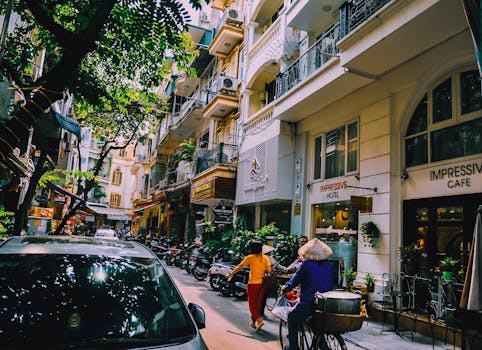
Vietnam, with its breathtaking landscapes, rich history, and vibrant culture, is a must-visit destination for many travelers. However, like any popular tourist spot, it has its share of scams that can catch unsuspecting visitors off guard. Being aware of these scams and knowing how to avoid them can help ensure a safe and enjoyable trip. Here’s a comprehensive guide on the most common scams in Vietnam and how to avoid them.
1. Taxi Scams
Description: Taxi scams are prevalent in Vietnam, especially in major cities like Hanoi and Ho Chi Minh City. Drivers might take longer routes, manipulate the meter, or claim that the meter is broken and demand a flat fee, which is often much higher than the actual fare.
How to Avoid: Use reputable taxi companies such as Mai Linh or Vinasun. Alternatively, use ride-hailing apps like Grab, which provide fare estimates and track your route.
2. Motorbike Rental Scams
Description: Renting a motorbike is a popular way to explore Vietnam, but it comes with risks. Some rental shops might rent out poorly maintained bikes or claim that you damaged the bike and demand exorbitant repair fees.
How to Avoid: Rent from reputable shops and thoroughly inspect the bike before renting. Take photos of any existing damage and ensure you have a written agreement detailing the rental terms.
3. Fake Tour Operators
Description: Fake tour operators might offer tours at very low prices, only to provide subpar services or not deliver on their promises at all. They might also take you to shops where they receive a commission.
How to Avoid: Book tours through reputable agencies and read reviews online before making a reservation. Be wary of prices that seem too low compared to other operators.
4. Street Vendor Scams
Description: Street vendors might overcharge tourists for goods or services. Common scams include selling fake or low-quality products, charging inflated prices, or giving incorrect change.
How to Avoid: Always negotiate prices before purchasing and be familiar with the local currency. It’s also helpful to shop at established markets or stores.
5. Fake Monks and Begging Scams
Description: Scammers posing as monks or beggars might ask for donations for fake causes. They often use emotional appeals to get you to give money.
How to Avoid: Verify the legitimacy of the charity before donating. Only donate to well-known organizations and avoid giving money to individuals on the street.
6. Pickpocketing and Bag Snatching
Description: Pickpocketing and bag snatching are common in crowded areas such as markets, train stations, and tourist attractions. Thieves often work in groups and use distractions to steal wallets, phones, and other valuables.
How to Avoid: Keep your belongings secure by using a money belt or a cross-body bag with zippers. Be especially vigilant in crowded places and avoid carrying large amounts of cash.
7. Fake Bus and Train Tickets
Description: Scammers might sell fake bus or train tickets, often at inflated prices. These tickets are not valid, and you might be left stranded without a way to reach your destination.
How to Avoid: Purchase tickets only from official sources, such as the bus or train station, or through reputable travel agencies.
8. Overpriced SIM Cards
Description: Buying a SIM card is necessary for staying connected, but some vendors sell them at high prices or with less data than promised.
How to Avoid: Purchase your SIM card from official stores, at the airport, or from reputable companies. Verify the data plan and price before buying.
9. Currency Confusion
Description: Some vendors might take advantage of the similarity between different denominations of Vietnamese Dong. For example, the 20,000 VND and 500,000 VND notes look quite similar, but there is a significant difference in value.
How to Avoid: Familiarize yourself with the local currency and always double-check your change. Take a moment to count your money carefully before handing it over.
10. Padded Bills in Restaurants and Bars
Description: It’s not uncommon for some restaurants and bars to add extra items to your bill or inflate prices, banking on the chance that you won’t notice.
How to Avoid: Always check the menu for prices and ask for a detailed bill. Avoid establishments that do not display their prices clearly. Reading reviews online before choosing a restaurant can also help.
11. The Eager Cobbler
Description: A common scam involves a cobbler approaching you on the street, pointing out a problem with your shoes, and offering to fix them. Once the repair is done, they demand an exorbitant fee.
How to Avoid: Politely decline any unsolicited offers for shoe repairs and keep walking. If you need shoe repairs, seek out a reputable shop.
12. The Squeaky Donut
Description: Street vendors might offer you a free sample of donuts or other snacks. Once you accept, they pressure you into buying a bag at an inflated price.
How to Avoid: Politely decline any unsolicited offers for free samples. If you want to try street food, approach vendors yourself and negotiate prices beforehand.
13. Fake Charity Collectors
Description: Scammers posing as charity workers might ask for donations for fake causes. They often use emotional appeals to get you to give money.
How to Avoid: Verify the legitimacy of the charity before donating. Only donate to well-known organizations and avoid giving money to individuals on the street.
14. ATM Skimming
Description: Scammers might install skimming devices on ATMs to steal your card information. These devices can be hard to detect and can lead to unauthorized withdrawals from your account.
How to Avoid: Use ATMs located inside banks or well-lit areas. Cover the keypad when entering your PIN and regularly monitor your bank statements for any unauthorized transactions.
15. Fake Hotel Booking Websites
Description: Scammers create fake hotel booking websites that look legitimate. They take your payment information and then disappear, leaving you without a reservation.
How to Avoid: Book hotels through reputable websites and read reviews. Verify the website’s legitimacy by checking for secure payment methods and contact information.
While scams can be a concern, they shouldn’t deter you from visiting Vietnam. By staying informed and vigilant, you can avoid falling victim to these common scams and enjoy all that this beautiful country has to offer. Always trust your instincts and seek help from local authorities if you find yourself in a difficult situation.
Vietnam is a land of history, culture, and beauty, and with the right precautions, your trip can be filled with wonderful memories and experiences. Safe travels!
You May Also Like …
Navigating Italy: Top Scams to Watch Out For and How to Avoid Them
Italy, with its rich history, stunning architecture, and delicious cuisine, is a top destination for…
Navigating Turkey: Top Scams to Watch Out For and How to Avoid Them
Turkey, with its rich history, stunning landscapes, and vibrant culture, is a popular destination for…
Navigating India: Top Scams to Watch Out For and How to Avoid Them
India, with its rich cultural heritage, diverse landscapes, and vibrant cities, is a popular destination…
Navigating Greece: Top Scams to Watch Out For and How to Avoid Them
Greece, with its stunning landscapes, rich history, and vibrant culture, is a popular destination for…
Navigating Italy: Top Scams to Watch Out For and How to Avoid Them
Italy, with its rich history, stunning architecture, and delicious cuisine, is a top destination for…
Cardi B Expresses Regret Over Relationship with Offset Amid Cheating Accusations
The relationship between Cardi B and Offset has always been a rollercoaster, filled with highs…
Morning Magic: Rituals to Energize and Focus Your Day
In the hustle and bustle of modern life, mornings can often feel like a race…
Unlocking Online Income: Proven Ways to Make Money from Home
The digital age has opened up a myriad of opportunities for making money online. Whether…
Lake Lure Dam Failure: A Catastrophic Event and Its Far-Reaching Implications
Weight Loss Made Easy: Delicious Meal Prep Recipes
In today’s fast-paced world, maintaining a healthy diet can be challenging, especially when trying to…

